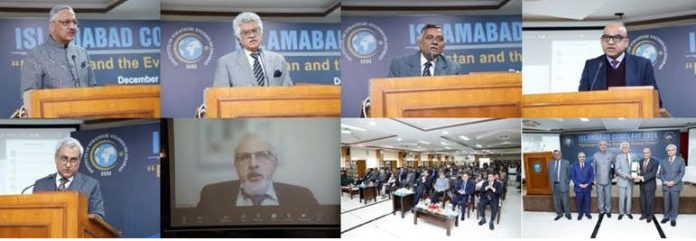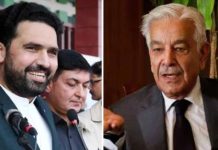ISLAMABAD, DEC 4 /DNA/ – The Institute of Strategic Studies, Islamabad (ISSI) held its flagship event the Islamabad Conclave-2024 on the theme “Pakistan and Evolving Global Order” On the first day of the event, on December 03, 2024, the Arms Control & Disarmament Centre (ACDC) hosted Working Session-II themed “Evolving Strategic Environment: Impact on Order, Institutions, and Norms.” General (Retd.) Zubair Mahmood Hayat NI(M) HI(M), former Chairman Joint Chiefs of Staff Committee was the keynote speaker, and other speakers included, Ambassador Zamir Akram, former Ambassador of Pakistan; Professor Andrey Pavlov, Head of the Master Program, from Saint Petersburg State University; Dr. Moonis Ahmar, Professor, University of Karachi, and Ambassador Tahir Hussain Andrabi, Director General (ACDIS), MOFA.
General (Retd.) Zubair Mahmood Hayat, in his keynote address, stated that the emerging global landscape was marked by evolving change and unpredictability, where norms and institutions were ineffective or in decline. The strategic environment was marked by geopolitical shifts, multipolarity, the rise of China, the resurgence of Russia, and the emergence of Indian influence. Technological advancements like AI, cyber technologies, and biotechnology were not only altering how nations interact but also creating new conflicts. Economic interdependence was fragmenting. Moreover, environmental threats were no longer confined to borders. Shifting alliances like NATO were facing internal tensions. Countries were forging new partnerships, which was bringing unpredictability to the international arena. Institutions like the UN were now facing criticism over lack of action vis-à-vis Palestine and Kashmir.
Earlier in his introductory remarks, Malik Qasim Mustafa, Director ACDC, stated that Pakistan must explore challenges and opportunities arising out of this evolving global environment to strengthen its national security and guide its foreign policy. To foster a more stable security environment in the region Pakistan believed in engaging in constructive dialogues with its neighbors and recognized the importance of multilateralism to addressing the challenges of arms control and strategic stability in the region and beyond.
Ambassador Zamir Akram in his remarks on “Dynamics of Global Strategic Environment,” stated that competing Western and Non-Western narratives were shaping the contemporary environment. In the contemporary world alliances between Russia and China were being called alliances without limits. Strategic and conventional arms race, proliferation of emerging technologies, reversal of arms control, and disarmament have contributed to the international environment. India-U.S. partnership was fueling aggression towards Pakistan and China. The notion of India as a ‘net security provider’ was problematic. South Asia region has three nuclear powers with territorial disputes, which makes it a highly volatile region. Pakistan needs to be realistic about its future strategic trajectory. He recommended strengthening Pakistan’s partnership with China.
Dr. Andrey Pavlov, Professor at Saint Petersburg State University, while speaking on “Evolving International Institutions, Norms, and Trends” stated that the complexities of the international environment, and unpredictability have made it uncertain what this multipolar world will look like. The arms control and disarmament regime has declined. It was difficult to distinguish between offensive and defensive, strategic to non-strategic weapons. There has been a deterioration of the arms control regime from the ABM treaty to New START, with no hopes of revival of the last U.S.-Russia bilateral arms control.
While speaking on “Regional Security Dynamics,” Dr. Moonis Ahmar, Professor at the University of Karachi stated that while the world has moved from a unipolar to a multipolar world growing Sino-Russian engagement was increasingly important. Major regional fault lines lie in the Indo-Pak unresolved conflicts. Unless there was betterment of Indo-Pak relations, peace and stability will remain elusive. Afghanistan was a major destabilizing factor in Central, South, and East Asia. For Pakistan, it was essential to invest in human security and development. Economic vibrancy and political stability, good governance, and the rule of law were vital for Pakistan. Strategic management, vision, and foresight were imperative to manage foreign policy for the next century.
While highlighting Pakistan’s perspective, Ambassador Tahir Hussain Andrabi, Director General, ACDIS at the Ministry of Foreign Affairs (MOFA), stated that the world was seeing an unprecedented increase in arms spending, arms races, new weapons at land, air, sea, and outer space. Major powers were pursuing nuclear force modernization while the arms control regime was in decline. Waivers and military hardware were being provided to India that were fostering asymmetries and accentuating arms disparities. India has an increasing disregard for international treaties. Overwhelming Indian military assets were deployed against Pakistan. India was still planning war under the nuclear overhang. Pakistan, on the other hand, exercises restraint and responsibility and avoidance of arms races. It maintains a Credible Minimum Deterrence. The way forward was the universal application of UN resolutions, faithful compliance of arms control arrangements by all, and cooperative multilateralism.

















